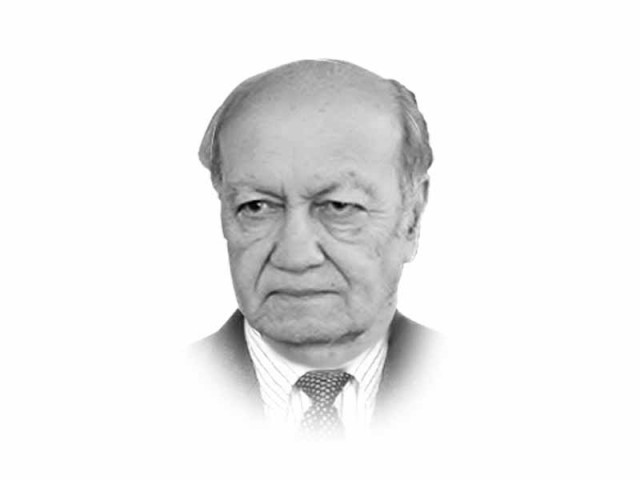Dialogue not brinkmanship
Both US and India feel very uneasy by the broad based and deep relationship of Pakistan with China

The writer is a retired lieutenant general of the Pakistan Army and a former federal secretary. He has also served as chairman of the Pakistan Ordnance Factories Board
It is unwilling to engage in dialogue with the Hurryiet leaders or with the younger generation leadership that is in the forefront of this movement. It is relying on the premise that sustaining protests at this high tempo for too long may not be feasible but has it factored in that the anguish and distrust against Indian hegemony could get internalised and emerge in more violent forms. Absence of strong and unifying leadership does place the Kashmiri struggle on an unknown trajectory. The rejection of the old leadership by the younger generation shows the level of frustration among them against the Hurryiet and other Kashmiri leaders.
Apart from the attraction of India’s expanding market, strategic imperatives and especially the US policy to contain China have brought India and US in a strong partnership. It has also given India the confidence to take a hard position against Pakistan. With the election of Donald Trump, PM Modi would feel even more emboldened toward Pakistan as the two leaders seem to share similar views on dealing with militant groups especially the Haqqani network, Taliban and LeT. Their attitude towards Muslims in general is equally belligerent. Trump during the election campaign was all praise for Modi, whereas he has generally made unkind remarks about Pakistan.
Both US and India feel very uneasy by the broad based and deep relationship of Pakistan with China. India has been particularly incensed by the CPEC project and is trying to create hurdles by exploiting dissident elements among Baloch nationalists. In addition, it is mounting a campaign in US Congress to declare Pakistan a state sponsor of terrorism. An online petition by Americans largely of Indian origin crossed the 100,000 mark that has to be taken notice of by the administration. It is indeed an absurd petition considering that Pakistan has been in the forefront of fighting terror and faced the worst brunt of the Afghan conflict. Demonising Pakistan by distorting its moral and diplomatic support for Kashmir, as state sponsored terror will be akin to closing eyes to reality. True, Pakistan at one stage did employ non-state actors to counter India’s preponderance in military strength and economic power but gradually has set that policy aside. For it realised that it provided India a false alibi for mounting a propaganda blitz against Pakistan and a ruse for deflecting world attention from the Kashmiri resistance movement. In addition, these jihadi groups were proving to be a liability and a potential threat to Pakistan’s internal security. Moreover, Pakistan’s professional and battle-hardened armed forces and comprehensive nuclear capability are sufficient deterrent against any hegemonic designs of India.
Our government has also expressed its willingness to cooperate in any independent investigation pertaining to the Pathankot and Uri incidents. With meticulous fencing of border on the Indian side and troops deployed across the LoC by both countries it is not easy for militants to cross the border and mount attack on such hardened targets as Pathankot and Uri.
Clearly, Pakistan needs to raise greater awareness of human rights abuses in Kashmir at the global level. It is mere expediency and narrow national interest of world powers that prevent them from speaking about it. According to reliable independent sources nearly 100 people have died and thousands critically injured with many having lost their eyesight. India has detained nearly 9,000 Kashmiris hoping that it would quell demonstrations and break their will.
India has to realise that if it aspires to be a global player it will have to change its regional policy especially with respect to Pakistan. The present state of relations where dialogue has been suspended and armed skirmishes and firing exchanges have become a routine on the LoC and working boundary are no solution to the problems that bedevil the two countries. On the contrary, people need peace so that national resources and priority of government is accorded toward their betterment. Moreover, as tensions rise finding solutions to sensitive bilateral issues of Kashmir, Siachen and Sir Creek become even harder.
There also has to be a more honest internal appraisal of what each country can do to regain the other’s confidence. India and Pakistan are nuclear states and if they fail to resolve their differences bilaterally it can have catastrophic global consequences. It is important that both countries stop firing on the LoC as a first step and resume dialogue at the foreign secretary level along with the respective DGMOs. This could be the first step in easing tension and initiating the process of dialogue. In this way there will be no loss of face for either side and could lead to a more enduring ceasefire at the LoC, a prerequisite for easing tensions. If this does not occur soon and indiscriminate firing continues with casualties mounting on both sides the situation could get out of control.
The role of electronic and print media in both countries, apart from a few laudable exceptions, has been most unhelpful and is waging its own war of words. It seems they have equated hyper nationalism with patriotism and are competing to outdo each other. Mr Sartaj Aziz expected visit to attend the Heart of Asia Conference in Amritsar provides another opening for the two countries to break the current deadlock. Pakistan has taken this bold step despite opposition from several quarters it is now for India to reciprocate.
Published in The Express Tribune, November 23rd, 2016.
Like Opinion & Editorial on Facebook, follow @ETOpEd on Twitter to receive all updates on all our daily pieces.














COMMENTS
Comments are moderated and generally will be posted if they are on-topic and not abusive.
For more information, please see our Comments FAQ